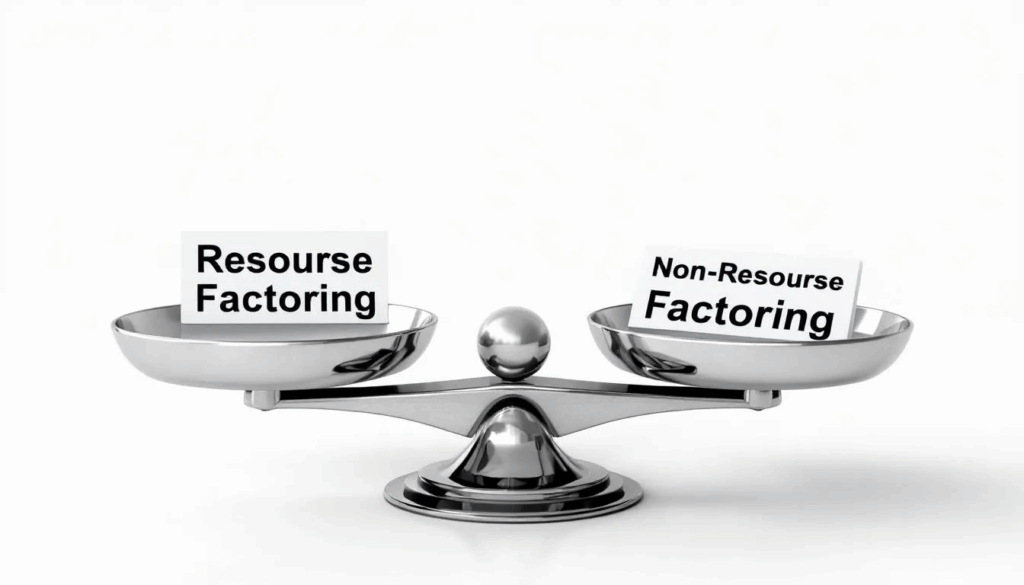What is Accounts Receivable Factoring?
Accounts receivable factoring is when a business sells unpaid invoices for an immediate cash advance. It’s also called invoice factoring or factoring receivables. Sometimes, you might see it referred to as invoice financing or accounts receivable financing, although these are generally broader terms that encompass different funding arrangements.
With invoice factoring, ownership of the invoices transfers to the company purchasing them, known as the factoring company or factor. The factor purchases the invoices at a discounted rate, issues the cash advance, and then collects on the payment.
How does Accounts Receivable Factoring work?
Accounts receivable factoring is a straightforward financial transaction that allows businesses to turn unpaid customer invoices into immediate working capital. The process involves selling invoices to a factoring firm in exchange for an advance on the invoice amount. Here’s how the process typically works step-by-step:
1. Submit Invoices to the Factoring Company
Once a business provides goods or services to its clients, it issues invoices to those clients. The business then submits these outstanding invoices to a reputable factoring company for consideration.
2. Credit Review of Customers
The factoring company reviews the creditworthiness of the invoiced clients. Since many factoring companies base their decisions on the reliability of the clients rather than the business itself, they typically look for creditworthy customers who are likely to pay on time.
3. Advance Payment
After reviewing the invoices, the factoring company advances a percentage of the total invoice value—usually between 70% to 90%—to the business. This advance gives the business fast access to working capital.
4. Customer Payment Collection
The factoring company accepts responsibility for collecting payment directly from the business’s customers. Customers are notified to remit payments to the factoring firm, rather than the original business.
5. Final Payment and Fee Deduction
Once the client pays the invoice in full, the factoring company pays the remaining balance to the business, minus a small factoring fee. This fee compensates the factoring firm for the service and the risk taken on during the transaction.
Important Considerations
In cases of customer non-payment, the structure of the agreement matters. With recourse factoring, the business may be required to buy back the unpaid invoice. With non-recourse factoring, the factoring company accepts the risk of default under specific conditions, such as customer bankruptcy.
Choosing a reputable factoring company is crucial for ensuring transparent terms, prompt funding, and dependable customer service. Because many factoring companies operate differently, it’s essential to understand the contract terms before committing.
Let’s look at an example.
Accounts Receivable Factoring Example
The XYZ Company has a factoring agreement with the following terms:
-
Discount rate: 3%
-
Advance Rate: 95%
-
Factoring fee: 2%
The company’s customers are required to pay within 30 days of receiving the invoice. XYZ currently has $25,000 in accounts receivable that it wants to factor.
It sends the invoices to the factoring company, which then runs credit checks on the customers. If approved, it purchases the accounts receivable but applies a 3% discount, making the purchase price $23,750.
The factor issues a cash advance to the XYZ company at the advance rate of 95%, for a total of $23,038. The remaining $1,212 is deposited into a reserve account until the customer pays off the invoice amount, which they now owe to the factoring company.
Assuming customers pay off on time, the factoring company applies a 2% factoring fee, which amounts to $500, deducted from the reserve amount. The factor then issues the remaining $712 to XYZ Construction.
What is Recourse Factoring?
Recourse factoring means that the factoring company can require the company to repurchase factored invoices if the customer does not pay. Recourse factoring is more common than non-recourse factoring in the market.
In recourse factoring, lenders face minimal risks because the business guarantees payment in the event of customer defaults. The company makes every effort to collect payment from the customer in recourse factoring. However, if an outstanding invoice becomes bad debt, the factoring company transfers that bad debt back to the business that originally sold the invoice.
The company that initially factored the invoice must collect it from the customer. In some cases, it may be necessary to sell the bad debt to a collections agency to recoup some value from it.
The factoring company assumes less risk with recourse factoring, which offers several advantages. It’s easier to qualify for recourse factoring, and there are few limitations on what invoices a business can factor. Factoring with recourse allows businesses to receive higher advance rates on their invoices compared to non-recourse factoring.
Recourse factoring agreements typically have looser terms and conditions. Additionally, since the factoring company is taking on less risk, it usually offers lower rates and higher advances.
Your business should consider recourse factoring if your customers are reliable and already have established processes for running credit checks. The primary risk associated with recourse factoring is that your customers may not make payments. Recourse factoring is the better option if you’re confident in their creditworthiness.
Recourse Factoring Pros & Cons
Pros:
-
The most common form of factoring
-
Lower qualifications
-
Less expensive
-
More flexible advance rates
-
More flexible contracts
Cons:
-
A greater risk if a customer doesn’t pay
-
It could impact cash flow if you have to purchase
What is Non-Recourse Factoring?
Non-recourse factoring means the factoring company assumes most of the risk of non-payment by customers. The non-recourse factoring agreement outlines when the factoring company is responsible for non-payment and when it can force the repurchase.
Non-recourse factoring typically incurs higher fees than recourse factoring, due to the increased risk for the factoring company. In addition, the approval requirements are more stringent. Non-recourse factoring relies on reliable customers with a solid payment history.
Most factoring companies that provide non-recourse factoring maintain a credit check process. Each time a company submits an invoice, the business that owes the invoice amount must pass the credit check.
Non-Recourse Factoring Limitations
Every factoring company that offers non-recourse factoring applies different rules. Some stipulate that they only assume credit risk in the case of bankruptcy or insolvency. Review the non-recourse agreement before committing to ensure you understand the requirements.
Other factoring companies have broader rules but exclude bad debt invoices in certain situations. Some of the common exclusions for non-recourse factoring include:
-
Invoices that didn’t go through the factoring company
-
Disputes over invoices
-
A breach of contract
-
If the company selling invoices contributed to the credit problem
Since the factoring company assumes more risk, it charges higher fees and offers a lower advance rate. Getting approved is more difficult as the factoring company runs a credit check on your customers before approving invoices.
Non-Recourse Factoring Pros & Cons
Pros:
-
The factoring company handles your collections
-
You only have to buy back bad debt in some instances
-
Protects against non-payment due to debtor bankruptcy
Cons:
-
More expensive than recourse factoring
-
More difficult to get approval
-
Only available for certain companies
Is Recourse or Non-Recourse Factoring better?
Choosing between recourse and non-recourse factoring comes down to your relationship with your customers. Both types of factoring enable businesses to enhance their cash flow and manage operational costs more effectively.
If you have a solid relationship and your customers pay on time, then recourse is the better choice. For riskier customers with poor payment histories, non-recourse factoring makes the most sense. Either option requires working with a good factoring company.
Questions to ask yourself when deciding include:
-
How reliable is the customer?
-
Can your business absorb a bad debt repurchase?
-
What situations does non-recourse cover?
How can I qualify for Accounts Receivable Factoring?
Since factoring depends more on your customers’ credit than yours, qualifying is easier. Some factoring companies don’t have minimum qualifications as long as you have a verifiable invoicing process.
Qualifications
In general, approved companies meet the following minimum qualifications:
-
Credit score of 550+
-
In business for at least 1 year
-
$250k+ in annual revenue
How to apply for Invoice Factoring:
You can apply for accounts receivable factoring through United Capital Source. Follow these instructions to apply for receivables factoring.
Step 1: Make sure your customer is reliable
Factoring invoices only works when your customers pay their invoices on time and in full. Ensure your customers will pay before contacting a factoring company.
Step 2: Gather your documentation
When you apply, the factoring company needs to review the following documents:
-
Driver’s license
-
Voided business check
-
Bank statements from the previous three months
-
Accounts receivable aging report, Accounts payable report, and debt schedule
Step 3: Apply
You can complete our one-page application or call us to apply. Either way, you’ll need to provide the information above and the invoice amount you want to sell.
Step 4: Speak to a representative
Once you apply, one of our representatives will contact you to discuss the factoring fee, factoring rate, and terms associated with the sale. You’ll get an upfront breakdown of all costs, so you don’t have to worry about hidden fees.
Step 5: Receive approval
The entire process takes about two weeks to finalize. Funds will appear in your bank account 1-2 days after completing the application.
Frequently Asked Questions
Here are the most common questions about non-recourse factoring.
What is Notification Factoring?
Notification factoring occurs when the factoring company notifies your customers when it purchases their invoices. If you don’t want your customers to know you sold their invoices, look for a company that doesn’t require notification factoring.
What if I’m declined for Invoice Factoring?
If you were declined, it’s likely that your customers didn’t meet the credit requirements. There are other options for small business financing if accounts receivable factoring doesn’t work for you.
Small Business Loans
Small business loan options include:
Non-Recourse Factoring – Final Thoughts
Non-recourse factoring is best for startups, newer companies, or those with unreliable or unproven customers. Small business owners who know and trust their customers can save more money and have more flexibility with recourse factoring.
You can contact us to learn more about accounts receivable factoring for your business.















